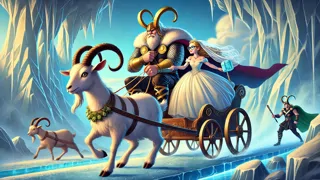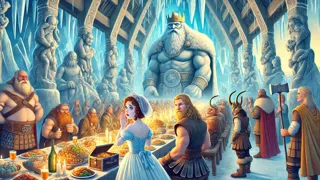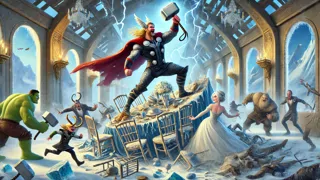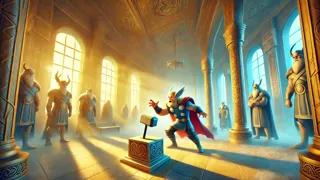Introduction
In the heart of the Viking world, where the wind howled over pine-clad mountains and icy rivers cut through ancient stone, legends grew as wild as the northern forests. Among these tales, none was as uproarious, nor as beloved, as the saga of Thor and his missing hammer. Mjölnir was more than a weapon—it was thunder itself, the guardian of Asgard and Midgard. Without it, every god felt exposed, and every giant emboldened. It all began on a morning when the air still shimmered with the memory of a storm, and Thor, mighty son of Odin, woke to the chilling realization that his most treasured possession had vanished. His broad hands groped for the familiar haft beside his bed, finding only cool emptiness. The gods had faced monsters and tricksters, but nothing prepared them for the day their greatest warrior was disarmed—not by battle, but by a cunning thief.
Asgard itself seemed quieter, its golden halls shadowed by worry. Thor’s wrath echoed through the realm, rattling shields and shattering the peace. The culprit, it soon became clear, was Thrym, king of the frost giants—a being as boastful as he was bold, and now in possession of the very power that kept his kind at bay. What Thrym demanded in exchange was outrageous: the hand of Freya, the most beautiful goddess, as his bride. It was a proposal only a giant could think reasonable, and only the gods could scheme to outwit.
Thus began an adventure unlike any other. With Loki’s quicksilver tongue and Thor’s reluctant sense of humor, the gods plotted a ruse that would take them from Asgard’s shimmering halls to the rugged domain of Jotunheim. In this saga, thunder wears a bridal veil, wit wins the day, and the world is reminded that even the mightiest can laugh in the face of danger.
The Hammer’s Disappearance and Loki’s Bold Plan
Thor’s bellowing rage rolled across Asgard, startling birds from their perches and sending lesser gods scurrying for cover. He overturned benches and upended barrels, demanding answers from all who dared cross his path. Only one seemed unafraid: Loki, the infamous trickster. With his sly smile and quick wit, Loki sauntered into Thor’s chamber, already calculating the angles of a story worth telling.

“Lost something, have you?” he asked, feigning innocence while his eyes sparkled with mischief.
Thor scowled, his great beard bristling. “Mjölnir’s gone. I’ll not rest until it’s found. And if you’ve had a hand in this—”
“Peace, thunderer,” Loki replied, raising his hands. “This is no time for threats. Let’s find your hammer before the giants realize Asgard is vulnerable.”
Together, they visited the all-seeing goddess, Frigg, whose wisdom was as deep as the fjords. She consulted her ravens and whispered to the winds, learning that Thrym, king of the frost giants, had stolen the hammer and buried it eight miles beneath the earth in Jotunheim. He would not return it unless Freya herself agreed to become his bride.
Freya’s fury matched Thor’s. She tossed her famed necklace, Brísingamen, to the floor and declared, “I’d sooner marry a wolf!” The gods held council. Sif, Thor’s golden-haired wife, suggested they outwit Thrym. Heimdall, the vigilant guardian of the rainbow bridge, proposed a plan so outrageous it made even Loki’s eyes widen: Thor must disguise himself as Freya and go to Jotunheim in her stead.
Thor blanched. “Me? In a wedding dress?”
Loki grinned. “You want your hammer back or not?”
The gods worked quickly. They draped Thor in silks and jewels, veiling his face and layering him with Freya’s shimmering garb. Loki, always keen on mischief, volunteered to play the handmaid. With a wig of golden hair and a mischievous glint, he completed the unlikely pair.
Beneath their disguises, nerves jangled. Thor’s hands gripped his skirts with the same force he once reserved for Mjölnir. Loki whispered encouragements, equal parts sincere and mocking. Together, they mounted Thor’s goat-drawn chariot, the wheels sparking on the Bifröst as they raced towards Jotunheim and a rendezvous with destiny.
As they drew near Thrym’s great hall—carved from ice and stone, guarded by giant hounds—the tension grew. Every god and giant in the realm would be watching. But behind veils and bravado, Thor and Loki prepared for a performance that would be retold for centuries.
The Wedding Feast: Deception Among Giants
The chariot thundered to a halt before Thrym’s fortress, its gates flanked by stone wolves and icy spears. Thrym, massive even for a giant, awaited them on a dais of frozen bones. His beady eyes widened with greedy delight as he beheld the veiled 'bride' and her attendant. The hall was crowded with giants, their laughter echoing like thunder against the cold walls.

“Welcome, most beautiful of goddesses!” Thrym boomed, bowing with exaggerated grace. “Tonight, all Jotunheim will witness our union.”
Thor said nothing, lowering his gaze and gripping his skirts so hard that the seams groaned. Loki flitted at his side, bowing and curtseying, spinning tales of Freya’s shyness and exhaustion from the journey.
The feast that followed was as riotous as it was grotesque. Piles of roast oxen and barrels of mead were brought forth. Thrym sat beside his 'bride', beaming. But soon, murmurs began to ripple through the hall.
For as soon as the food arrived, Thor’s appetite betrayed him. He devoured an entire ox, eight salmon, all the dainties intended for the women, and drank three kegs of mead—drawing astonished stares from every giant present.
Thrym leaned over to Loki, his brow furrowed. “Is this how Freya eats in Asgard?”
Loki laughed lightly, always ready with a lie. “She hasn’t eaten for eight days, so eager was she for your hand!”
Thrym nodded, mollified, but grew suspicious again when Thor’s burning gaze flared from beneath the bridal veil. “Why are Freya’s eyes so wild?”
“Ah,” Loki replied smoothly, “she hasn’t slept for eight nights—so eager was she to come to Jotunheim.”
The giants relaxed, but Thor could barely contain his impatience. All he could think of was Mjölnir, so close but maddeningly out of reach. Loki, meanwhile, watched every movement, calculating the moment to act.
Finally, Thrym could wait no longer. He signaled his kin. “Bring forth the hammer! Place it in Freya’s lap, as a wedding gift. Let the gods and giants witness our union.”
Thor’s heart thundered. As two burly giants hauled in a chest adorned with runes and ice, he tensed beneath the silks. The chest was opened, and Mjölnir gleamed—a beacon of power and hope—cradled in velvet. Thrym placed it reverently in the 'bride’s' lap, expecting gratitude.
The moment the hammer touched his knees, Thor sprang up. The veil tore away, revealing a face twisted with triumph and fury. The giants froze in horror as Thor’s hands closed around Mjölnir’s haft. In an instant, thunder rolled and lightning danced. Loki, never one to miss a cue, leaped aside as chaos erupted.
Thunder Unleashed: The Triumph and Return
In that heartbeat between revelation and disaster, the air itself seemed to freeze. Thrym’s eyes widened in disbelief, and every giant in the hall reached for weapons too late. With a roar that shook the icy rafters, Thor leapt atop the banquet table, shattering platters and sending goblets flying. Mjölnir sang through the air in his mighty grip, lightning crackling along its runes.

Thor’s first swing struck Thrym full in the chest, flinging the giant king across the hall like a ragdoll. The blow echoed like a thunderclap in a summer storm. Giants scrambled for cover; some tried to flee, but Thor was everywhere at once—a storm incarnate. Plates whirled and mead sloshed as he sent one giant after another tumbling through splintered doors and shattered windows.
Loki weaved through the chaos, his disguise discarded, turning panic to opportunity. With clever words and dazzling misdirection, he led a few giants on a wild chase, only to slip away at the last moment. Meanwhile, Thor’s laughter boomed louder than any thunder, his spirits soaring with each victorious blow. It was the revenge of a god wronged and the restoration of order in a world teetering on the edge.
Within minutes, the once-great hall was a ruin of broken beams and toppled thrones. The surviving giants cowered behind pillars or fled into the swirling snow outside. Mjölnir hummed contentedly in Thor’s grip—a hammer restored to its rightful owner.
Standing amidst the wreckage, Thor cast off the last shreds of his bridal attire. Loki appeared at his side, brushing dust from his sleeves and grinning like a fox.
“I suppose that wasn’t so terrible,” Thor admitted gruffly, though his cheeks flushed with relief and pride.
Loki laughed. “You make a fearsome bride, thunderer. Remind me never to upstage you at a feast.”
Their laughter echoed through the hall as they strode outside into the pale northern sun. The goats pawed at the snow, eager for home. Together, Thor and Loki mounted the chariot. As they soared over the mountains and through the shimmering Bifröst, Asgard’s towers glimmered ahead.
The gods welcomed them with cheers and song. Sif embraced Thor; Freya winked at Loki, whose wit had saved the day. Odin himself lifted his horn in salute to courage—and to humor.
From that day forward, no giant dared covet Mjölnir again. And in every fire-lit hall across the north, skalds spun the tale of how thunder wore a bridal veil and laughter triumphed over fear.
Conclusion
So ends the wildest chapter in the saga of Thor and his hammer—a tale woven with mirth as much as might. Through wit, courage, and the willingness to look utterly ridiculous for a worthy cause, Thor reclaimed Mjölnir and restored balance to the worlds. Loki’s clever tongue proved once again that brains could sometimes outpace brawn, even in the company of gods. The story spread far and wide, a favorite among Norse firesides not just for its victory but for its laughter—the kind that chases away even the darkest winter nights.
In Asgard, Thor wore his triumph lightly but never again underestimated the power of a good disguise—or a loyal friend. Freya’s necklace was returned, the halls rang with renewed confidence, and even Odin chuckled at the memory of thunder in a wedding dress. And somewhere across Midgard, mortals whispered the lesson: sometimes the world is saved not by solemn strength but by a joke well played and a heart willing to risk a little foolishness for the sake of all.
The legend of Thor’s disguised rescue endures because it reminds us that even the greatest heroes sometimes need to laugh at themselves. In a universe ruled by fate and fury, there’s always room for a story that leaves the world brighter than before.

















